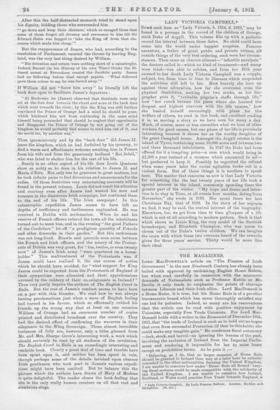LADY VICTORIA CAMPBELL.*
SOME such item as "Lady Victoria, b. 1854, d. 1910," may be• found in a peerage in the record of the children of George, sixth Duke of Argyll.. This volume fills up with a pathetic record the interval between these dates. No child could have come into the world under happier auspices. Famous ancestors, a father of great public and private virtues, all outside things of the very best ordering, such were her circum- stances. Then came an obscure ailment—" infantile paralysis 'r the doctors called it---:which no kind of treatment—and many were tried—was able to subdue, and from her fifth year onward to her death Lady Victoria Campbell was a cripple,. subject, too, from time to time to illnesses which suspended the activities still left to her. How bravely she bore up• against these adversities, how far she overcame even the physical disabilities, making her two sticks, as her bio- grapher puts it, "veritable pilgrim's staffs through life,' how " her couch became the place where she learned the deepest and highest converse with the life unseen," how she busied herself unceasingly with plans for the welfare of others, we read in this book, and excellent reading it is, as moving a story as we have seen for many a day. Much, of course, more or less resembles what we hear of other workers for good causes, but one phase of her life is peculiarly interesting because it shows her as the worthy daughter of the great Campbell house. Amongst the Argyll estates is the island of Tyree, containing some 19,000 acres and between two, and three thousand inhabitants. In 1847 the Duke had been offered for it a tempting price—a sum which would bring in £1,200 a year instead of a revenue which amounted to nil— bet preferred to keep it. Possibly he regretted the refusal when some years later the cotter •agitation broke out in a violent form. But of these things it is needless to speak here. The matter that concerns us now is that Lady Victoria for something like the last twenty years of her life took a special interest in the island, commonly spending there the greater part of the winter. "My hope and desire and inten- tion is to stay in Thee, at all events four months, dating from November," she wrote in 1E91. She spent there her last Christmas Day, that of 1909. In the story of her sojourn we find, it may be said, the central interest of the biography. Elsewhere, too, we get from time to time glimpses of a life which is not at all according to modern pattern. Such is that which shows us Lizzie King, the very Model of the Scottish housekeeper, and Elizabeth Champion, who was nurse to- eleven out of the Duke's twelve children. We can imagine the scorn with which these two veterans heard of the rewards. given for three years' service. Thirty would be more like their ideal.


















































 Previous page
Previous page